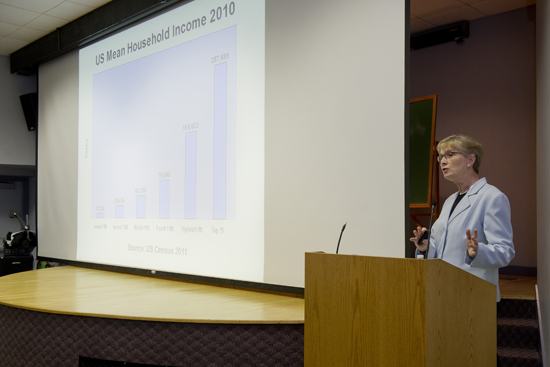They’ve Occupied—Now What?
Teach-in looks back, forward at Occupy movement

Susan Lee, a College of General Studies senior lecturer in social sciences, discussed the growing disparity between incomes in the United States at the BU Occupies Boston Teach-In Wednesday night. Photo by Vernon Doucette
With less than 24 hours left on a restraining order barring the city from evicting Occupy Boston protestors from Dewey Square, BU professors and students met Wednesday evening to discuss the origins of the Occupy movement and the likelihood that it would have a lasting impact on society. The movement, which began in September with a small encampment of protesters in New York’s Zuccotti Park, spawned dozens of camps in cities across the country.
In Boston yesterday, a Suffolk Superior Court judge extended the protestors’ temporary restraining order until December 15, making Dewey Square the site of the nation’s longest running occupation. And while many Occupy camps in other cities have been cleared by police in recent days, the spirit, and the language—“We are the 99 percent”—of the movement are very much alive.
At Wednesday’s teach-in, which was attended by about 30 people and hosted by BU Occupies Boston at the College of Communication, professors argued that any lasting influence would depend on new legislation based on the movement’s demands, and on the effectiveness of leaders who might emerge from the movement.
Walter Fluker, the Martin Luther King, Jr., Professor of Ethical Leadership at the School of Theology, applauded the movement for its “horizontal and directly democratic structures.” But he stressed the importance of having central figures associated with it in making real change, citing the influence of Martin Luther King, Jr. (GRS’55, Hon.’59) on the civil rights movement.
“It’s a necessity to begin to think about leadership,” said Fluker (GRS’88). “It’s high time we begin to rethink how we perceive that conversation.”
Discussing the movement’s roots, Susan Lee, a College of General Studies senior lecturer in social sciences, said the Occupy movement sprang from frustration with a widening economic gap between the wealthy and the poor. She cited data from the Congressional Budget Office showing that between 1979 and 2007, the incomes of the top one percent of the population have grown about 277 percent, while those of the lowest fifth have grown only about 18 percent.
“When there’s so much money stuck at the top,” said Lee (GRS’03), “money does not circulate, and it slows our economy down. That hurts everyone, but it hurts the poor most of all.”
David Lyons, a College of Arts & Sciences professor of philosophy and a School of Law professor of law, agreed that the growing gap between the rich and the poor is a large part of the problem.
“Inequality undermines democracy,” said Lyons. “It undermines our ability to have an impact upon the political system, and that’s a problem.”
Cathie Jo Martin, a CAS professor of political science, suggested two political steps forward to achieve the Occupy movement’s goals. She advocated for replacing a two-party electoral system with a proportional representation system, which would allow more opinions to be expressed in Congress. She also favored a larger public sector, in the model of Scandinavian countries.
“The big public sectors in these countries are actually great sources of support of crises and engines of economic growth,” Martin said.
Ruha Benjamin, a CAS assistant professor of sociology and African studies, said the Occupy movement came to life because “people are rejecting the unspoken structure of our society.
“While the elite get to put their feet up, somehow the front rooms of government and the good life are not meant for everyday people who actually built the house,” she said. She described the movement as “a critical mass exodus from dens and backyards, kitchens and bedrooms, to the front room, peeling back the farce for a transformation of the status quo.”
Event organizer Anna Kelsey (CAS’14), a member of BU Occupies Boston, said she hoped the discussion would “spark more of a dialogue on campus,” especially with insight about the movement from professors.
“We’ve succeeded in establishing what the problems are,” she said. “We’ve reached people, and people are thinking about it. I’d like to see it move in a direction that takes more action.”
Allison Thomasseau can be reached at althoma@bu.edu.
Comments & Discussion
Boston University moderates comments to facilitate an informed, substantive, civil conversation. Abusive, profane, self-promotional, misleading, incoherent or off-topic comments will be rejected. Moderators are staffed during regular business hours (EST) and can only accept comments written in English. Statistics or facts must include a citation or a link to the citation.